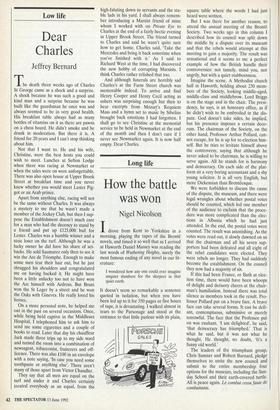Long life
How the battle was won
Nigel Nicolson
Idrove from Kent to Yorkshire in a morning, playing the tapes of the Brontë novels, and timed it so well that as I arrived at Haworth Daniel Massey was reading the last words of Wuthering Heights, surely the most famous ending of any novel in our lit- erature:
I wondered how any one could ever imagine unquiet slumbers for the sleepers in that quiet earth.
It doesn't seem so remarkable a sentence quoted in isolation, but when you have been led up to it for 350 pages or five hours of tape, it is devastating. I walked almost in tears to the Parsonage and stood at the entrance to that little parlour with its plain, square table where the words I had just heard were written.
But I was there for another reason, to attend the annual meeting of the Brontë Society. Two weeks ago in this column I described how its council was split down the middle by a dispute over its museum and that the rebels would attempt at this meeting to gain a majority. The result was sensational and it seems to me a perfect example of how the British handle their controversies: not tamely, mind you, nor angrily, but with a quiet stubbornness.
Imagine the scene. A Methodist church hall in Haworth, holding about 230 mem- bers of the Society, looking middle-aged, middle-class and middlebrow. Lord Briggs is on the stage and in the chair. The presi- dency, he says, is an honorary office, as if he didn't wish to be embroiled in the dis- pute. God doesn't take sides, he implied, but his presence imposes a certain deco- rum. The chairman of the Society, on the other hand, Professor Arthur Pollard, can- not escape, for he is up for re-election him- self. But he tries to levitate himself above the controversy, saying that although he never asked to be chairman, he is willing to serve again. All he stands for is harmony and democracy. On each side of the plat- form sit a very boring accountant and a shy young solicitor. It is all very English, but more Dickensian than Bronteesque.
We were forbidden to discuss the cause of the dispute, the museum, and there were legal wrangles about whether postal votes should be counted, which led one member of the audience to exclaim that the proce- dure was more complicated than the elec- tions in Albania which he had just attended. In the end, the postal votes were counted. The result was astonishing. As the votes were read out, it slowly dawned on us that the chairman and all his seven sup- porters had been defeated and all eight of the rebel candidates were elected. They were rebels no longer. They had suddenly become the establishment. On the council they now had a majority of six.
If this had been France, or Bath at elec- tion time, there would have been whoops of delight and derisory cheers at the chair- man's humiliation. Instead there was total silence as members took in the result. Pro- fessor Pollard put on a brave face. A brave face can take several forms. It can be defi- ant, contemptuous, submissive or merely sorrowful. The face that the Professor put on was exultant. 'I am delighted', he said, `that democracy has triumphed.' That is what he said, but it was not what he thought. He thought, no doubt, 'It's a funny old world.'
The leaders of the triumphant group, Chris Sumner and Robert Barnard, pledge themselves to unite the new council and submit to the entire membership four options for the museum, including the Sun-
day School and their earth-covered turtle. All is peace again. Le combat cessa faute de combattants.


















































 Previous page
Previous page